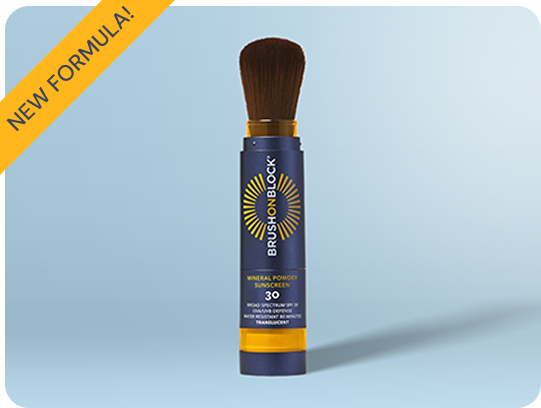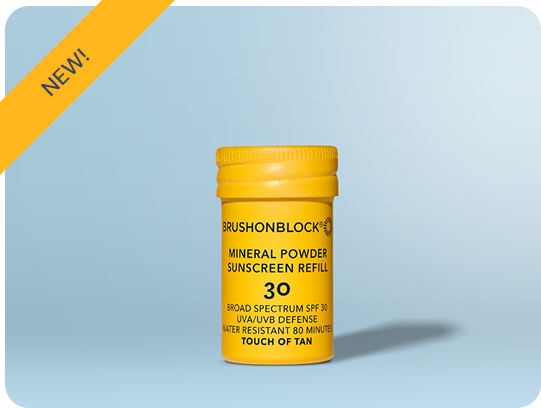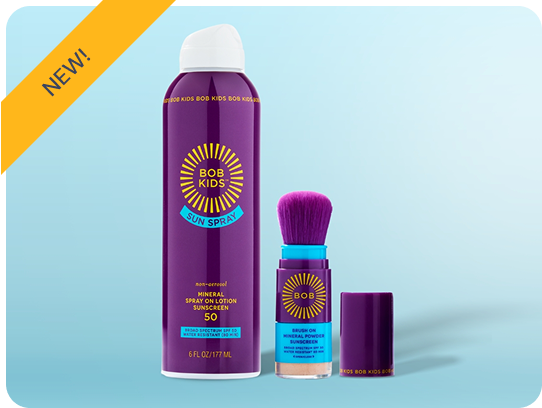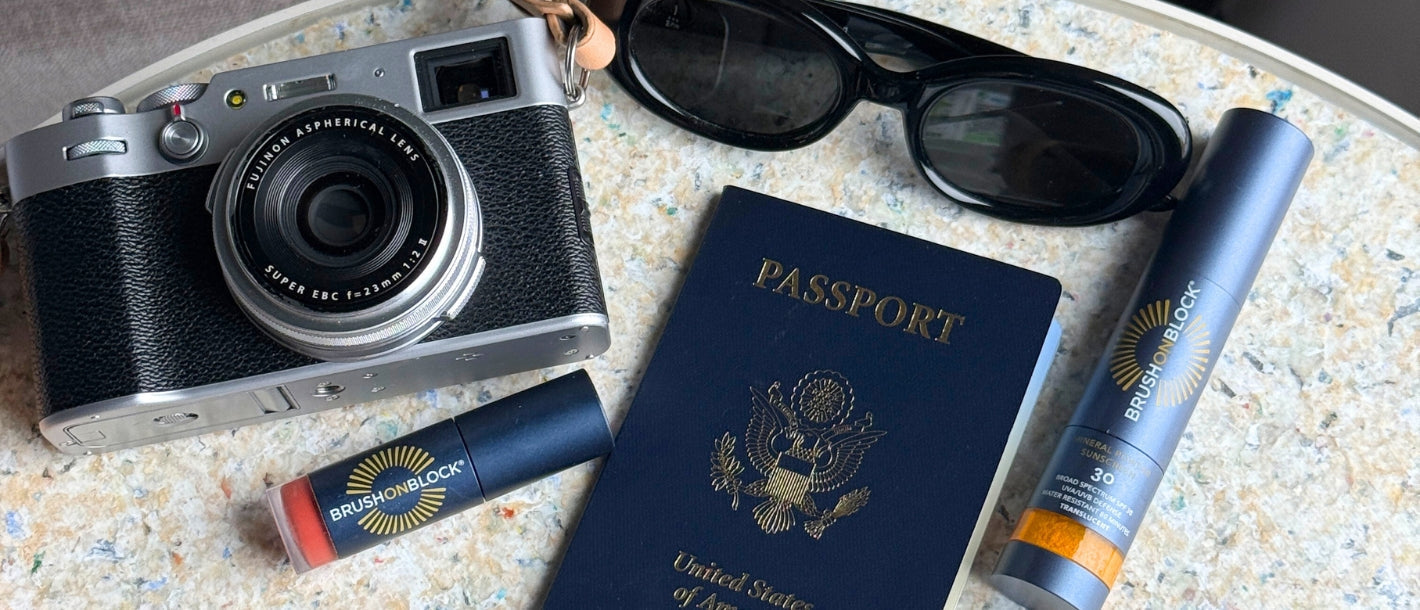When my oldest daughter broke out with contact dermatitis from chemical sunscreens, everything about how our family approached sun protection changed overnight. If you have sensitive or easily irritated skin, you’ve probably been there too, trying product after product and feeling frustrated when nothing works.
That’s what led me to create Brush On Block. For more than a decade, I’ve been dedicated to developing mineral sunscreens that actually work for people whose skin can’t tolerate traditional formulas. The solution isn’t skipping sunscreen, it’s finding protection your skin can live with. Mineral SPF doesn’t fight your skin, it works with it. And once you understand that, you can build a routine that protects, soothes, and supports your skin every day.
Why Sensitive Skin Reacts to Most Sunscreens
Sensitive skin reactions typically stem from three culprits: chemical UV filters, preservatives, and fragrances. Chemical ingredients like avobenzone, octinoxate, and oxybenzone can trigger contact dermatitis, redness, itching, swelling and immediate burning sensations.
For people with eczema and sensitive skin conditions, dermatologist Dr. JiaDe "Jeff" Yu at Massachusetts General Hospital advises to "avoid any sunscreen whose active ingredients are NOT titanium or zinc." The National Eczema Association specifically recommends mineral-based sunscreens with titanium dioxide and zinc oxide because these physical blockers are less likely to cause irritation compared to chemical filters.
SOURCE: National Eczema Association - How to choose and use sunscreen when you have eczema
Some liquid sunscreens also require preservatives that frequently cause reactions. Parabens, and formaldehyde-releasing preservatives are common triggers I specifically avoided when formulating our products.

The Mineral Advantage: Zinc Oxide and Titanium Dioxide
Mineral sunscreens offer inherent advantages for sensitive skin that chemical formulations cannot match. These minerals work as physical blockers, sitting on the skin's surface rather than absorbing into skin like chemical filters.
Mineral UV filters generally show better tolerability profiles than chemical filters. Research indicates that zinc oxide and titanium dioxide are less likely to cause allergic contact dermatitis compared to organic (chemical) UV filters. The American Academy of Dermatology notes that physical blockers like zinc oxide are particularly recommended for those with sensitive skin or a history of sunscreen allergies.
SOURCE: https://www.aad.org/public/everyday-care/sun-protection/sunscreen-patients/sunscreen-faqs (American Academy of Dermatology - Sunscreen FAQs)
Our complete mineral sun protection product line is powered exclusively by zinc oxide and titanium dioxide, which are trusted mineral actives that deliver broad-spectrum protection without chemical filters. And zinc oxide naturally soothes inflammation, making it beneficial for rosacea, eczema, or general sensitivity while being non-comedogenic.

Building Your Sensitive Skin Protection Routine
Morning SPF Foundation: Sheer Genius Facial Moisturizer SPF 50
Our facial moisturizer provides broad-spectrum SPF 50 protection with skin-soothing squalane and hyaluronic acid. Apply to clean skin 15 minutes before sun exposure, for sheer, even coverage with no white cast.
Midday Reapplication: Brush On Block SPF 30 Powder
Our SPF 30 mineral powder provides fresh protection and layers seamlessly over your morning makeup routine. The powder offers unique sensitive skin advantages: no liquid preservatives, minimal ingredient exposure, and controlled application intensity.
Targeted Protection: Sun Shine SPF 30 Protective Lip Oil
Lips often show first signs of sensitivity to sun products. Our lip oil provides SPF 30 protection using gentle minerals with nourishing argan and sunflower seed oils and vitamin E. Reapply every two hours or after eating.
Ingredient Transparency for Sensitive Skin
When dealing with sensitive skin, ingredient transparency is essential. Every ingredient serves a specific purpose, and we've eliminated common sensitizers.
What We Include: Zinc oxide and titanium dioxide for protection, niacinamide for anti-inflammatory benefits, hyaluronic acid for hydration, natural antioxidants, and gentle mineral colorants.
What We Avoid: Chemical UV filters, parabens, alcohol-based ingredients, and harsh emulsifiers that trigger contact dermatitis.
This careful approach means you can use our products individually or as a complete system without ingredient conflicts.
Professional Guidance for Severe Sensitivities
The National Eczema Association recommends mineral sunscreens because they are "much less likely to cause irritation" for people with eczema. Similarly, the National Rosacea Society advises that "physical, or mineral, sunscreens containing zinc oxide (ZnO) or titanium dioxide (TiO2) are often recommended for rosacea as they are less likely to cause irritation."
SOURCES: National Rosacea Society - How to Choose the Right Sunscreen for Rosacea Skin
Patch test if you have metal compound allergies, though reactions to zinc oxide and titanium dioxide are extremely rare. For prescription treatment users, apply medications in the evening and use gentle mineral protection during the day.

Addressing Common Concerns
"Mineral sunscreens leave white cast." Modern formulations use iron oxides to reduce white cast. Our translucent powders and universal tints work across skin tones naturally.
"Powder doesn't seem protective enough." Mineral powder sunscreens undergo identical FDA testing as liquids, and provide the stated SPF protection when applied properly.
"I break out from every sunscreen." Sensitive, acne-prone skin often reacts to chemical actives, emulsifiers and preservatives in liquids. Mineral powders eliminate these triggers while providing oil-absorbing benefits.
Complete Protection Strategy
Effective protection goes beyond product selection to include proper application and environmental awareness.
Best Practices: Patch test for 48 hours, apply to clean dry skin, start with minimal amounts, and reapply every two hours. Consider that wind, heat, and weather changes can affect skin sensitivity.
Many makeup professionals prefer mineral powder sunscreens for sensitive-skinned clients because they offer buildable coverage, allow for controlled application, and can be layered over other products without causing irritation or disturbing existing makeup.
Building tolerance takes patience and consistency. Sensitive skin users who succeed start slowly, stay consistent, and don't give up after minor reactions. The goal is protected skin that doesn't compromise comfort.

Moving Forward with Confidence
If you've struggled with sensitive skin reactions to sunscreen, mineral protection offers a proven, gentle alternative. Start with patch testing, build gradually, and remember that routine and consistency matters more than perfection.
Your sensitive skin deserves protection that works with your unique needs. Our mineral formulas provide effective coverage without the irritation that has kept you from consistent sunscreen use.





